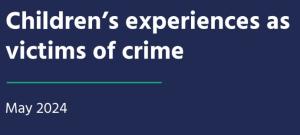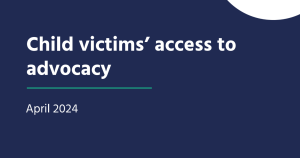Foreword from Dame Rachel de Souza
I was appalled and shocked to read the Serious Case Review relating to Child Q, which found the system designed to protect and support her had seriously failed. The Metropolitan Police has committed to learning lessons from this incident but the value in lessons being learnt comes from them not being repeated. That’s what sorry means, it means it won’t happen again. Child Q has been very strong and brave in using her experience to demand changes within the Metropolitan Police. It is beholden on all of us in positions of power and influence to respond to that call.
Part of my response was committing my office to a project about children’s experience of policing and how we can rebuild trust between children and those responsible for keeping them safe.[1] I am guided in this by the concerns that I heard from children in The Big Ask, the largest-ever survey of children that I conducted last year.[2] One girl, the same age as Child Q, told me this about the barriers she sees in her life:
“Racism and discrimination because it makes me feel like an outsider [and] police brutality especially towards black people” – Girl, aged 15.
I wanted to find out if what happened to Child Q was an isolated incident, or part of a more systemic problem with the use of strip searching. To do so, it was necessary to establish how many other children have been strip searched by the Metropolitan Police as part of stop and searches, and the circumstances of and safeguards around those strip searches. In this report, I am publishing Metropolitan Police data that I collected using my powers under the Children and Families Act 2014. It details the Metropolitan police force’s practice regarding the strip searching of children during stop and searches between 2018 and 2020.
I am deeply concerned by the information that I have received. I am not reassured that what happened to Child Q was an isolated issue, though it was certainly rare and the context unique. Instead, I believe it indicates more systemic problems around child protection. I remain unconvinced that the Metropolitan Police is consistently considering children’s welfare and wellbeing.
A police power that is as intrusive and traumatic for children as a strip search must be treated with the utmost care and responsibility. It must also be accompanied by a robust and transparent system of scrutiny to protect and safeguard vulnerable children. Practice in this area is not currently consistent across England.
I do not believe that any child should be strip searched without an Appropriate Adult present, apart from in the most exceptional cases, and only where there is immediate risk of harm to the child or to someone else.[3] I do not accept that such pronounced ethnic disproportionality should exist in the application of such an intrusive practice involving children. I do consider that the police should be able to readily account for the circumstances and appropriateness of every occasion that could put children at risk, because every child has the right to expect to be kept safe when interacting with the police.
I will be continuing to focus on this issue. I am keen to work with the Metropolitan Police and the incoming Metropolitan Police Commissioner to improve practice in London. I will also be replicating this analysis by requesting data from all police forces in England and will be engaging with the national policy framework for police strip searches to ensure that children are properly safeguarded and that searches are only ever undertaken where there is immediate risk of harm to the child themselves or someone else. I will continue to work to ensure that strip searching is only undertaken when absolutely justified, and that appropriate safeguards are in place to protect children, and to ensure that they are fully supported and cared for after a search has taken place.





